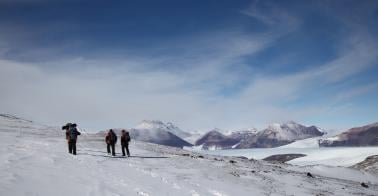
Explore the continent of Antarctica and more than 500 million years of geological history and 250 years of geographical discovery and scientific endeavour.
In this course, you will learn through lectures filmed on location on Ross Island and in the McMurdo Dry Valleys of Antarctica.
Read more
Explore the continent of Antarctica and more than 500 million years of geological history and 250 years of geographical discovery and scientific endeavour.
In this course, you will learn through lectures filmed on location on Ross Island and in the McMurdo Dry Valleys of Antarctica.
Explore the continent of Antarctica and more than 500 million years of geological history and 250 years of geographical discovery and scientific endeavour.
In this course, you will learn through lectures filmed on location on Ross Island and in the McMurdo Dry Valleys of Antarctica.
Cliff, an Antarctic veteran, with 12 seasons on the ice, will introduce you to some of our planet’s most remarkable landscapes—the Dry Valleys, the Transantarctic Mountains and the world’s southernmost volcanic island. At a remote field camp, he interviews fellow geologists studying fossil-rich sediments—from a time when Antarctica was 20°C warmer than today—to see what Antarctica’s past climate can reveal about what the future might hold.
Rebecca, a science historian and writer who has written extensively about Antarctica, visits Captain Robert Scott’s huts on Ross Island and interviews conservators from the Antarctic Heritage Trust and scientists and logistics staff working at Scott Base and McMurdo Station. You’ll learn about the explorers and scientists from around the world who have been drawn to work and sometimes risk their lives here—from James Cook’s first venture below the Antarctic Circle, to the British scientists who discovered the ozone hole, to the first women to work on the ice.
What you'll learn
- Knowledge of the chronology of Antarctic geology and human activities.
- The locations and significance of key geographic features of Ross Island and the Antarctic continent.
- How research is undertaken in Antarctica, both today and at key points in history.
- The role of Antarctic paleoclimate research in understanding present and future climate change including the impact on the Antarctic ice sheet volume and global sea levels.
What's inside
Learning objectives
- Knowledge of the chronology of antarctic geology and human activities.
- The locations and significance of key geographic features of ross island and the antarctic continent.
- How research is undertaken in antarctica, both today and at key points in history.
- The role of antarctic paleoclimate research in understanding present and future climate change including the impact on the antarctic ice sheet volume and global sea levels.
- Knowledge of the chronology of antarctic geology and human activities.
- The locations and significance of key geographic features of ross island and the antarctic continent.
- How research is undertaken in antarctica, both today and at key points in history.
- The role of antarctic paleoclimate research in understanding present and future climate change including the impact on the antarctic ice sheet volume and global sea levels.
Good to know
Save this course
Reviews summary
Good intro to antarctica
Activities
Career center
Geologist
Paleontologist
Science Writer
Science Educator
Environmental Scientist
Climate Scientist
Conservationist
Polar Researcher
Glaciologist
Geomorphologist
Environmental Consultant
Geophysical Data Analyst
Cartographer
Geospatial Analyst
Teacher
Featured in The Course Notes
Reading list
Share
Similar courses
OpenCourser helps millions of learners each year. People visit us to learn workspace skills, ace their exams, and nurture their curiosity.
Our extensive catalog contains over 50,000 courses and twice as many books. Browse by search, by topic, or even by career interests. We'll match you to the right resources quickly.
Find this site helpful? Tell a friend about us.
We're supported by our community of learners. When you purchase or subscribe to courses and programs or purchase books, we may earn a commission from our partners.
Your purchases help us maintain our catalog and keep our servers humming without ads.
Thank you for supporting OpenCourser.




